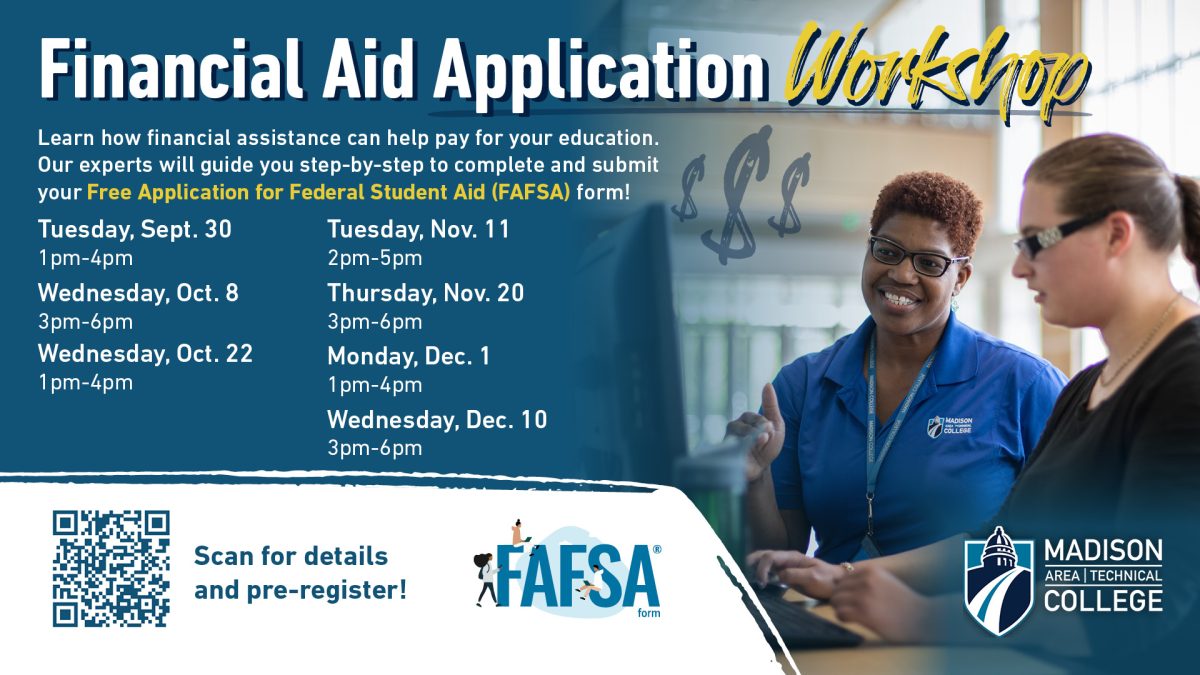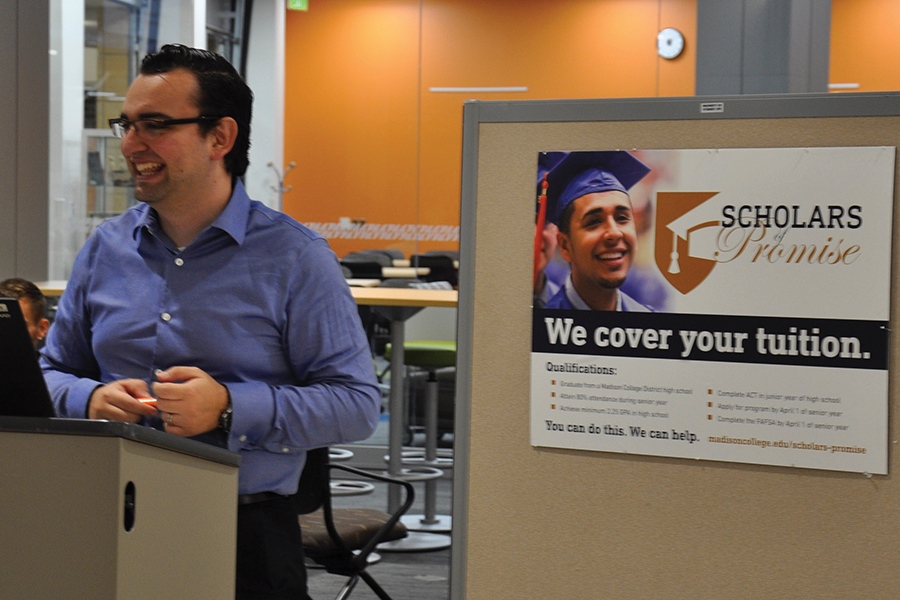Offering needed support for Scholars of Promise: Javier Neira Salazar enjoys helping students overcome barriers to education
Javier Neira Salazar, director of the Madison College Scholars of Promise Program, checks in students at a back-to-school event at the Truax Campus in mid-August.
August 28, 2017
Javier Neira Salazar’s passion is working towards eliminating socioeconomic barriers and the culture of inequality that plagues the United States. When his current job leading the Scholars of Promise program at Madison College opened up, Neira Salazar immediately thought “heck yea, I want it, I really want it.”
Scholars of Promise is based on President Barack Obama’s “America’s College Promise,” a program that works towards making community college and technical education free. The program is especially important for African American, American Indian, and Latino children who are statistically more likely to be of a low socioeconomic status.
Often these kids are unable to connect to the “prosperity grid,” a network of institutions and resources that foster economic mobility because of their low-socioeconomic status described by the Annie E. Casey Race for Results policy report. This inability to connect to the “prosperity grid” perpetuates the cycle of poverty. Programs like Scholars of Promise are designed to connect kids from low-income families to the “prosperity grid” and interrupt the cycle of poverty.
Scholars of Promise addresses the financial barrier to college by paying qualified students’ tuition. To qualify for the program, students must have completed high school with at least a 2.25 GPA, taken the ACT, applied to a Madison College degree program and completed the FASFA.
In addition to a financial barrier, many students run into a psychological barrier: the belief that they can’t go to college. That’s who Scholars of Promise is for said Javier Neira Salazar, the kids who “never thought that college was possible.” This barrier can come from any number of factors, including never having a role model who went to college. Without a support system like Scholars of Promise, these students, often first generation college students, are statistically more likely to fail out of college.
The inequalities between low-income and high-income kids start as early as birth. “Children’s initial reading competency is correlated with the home literacy environment, number of books owned, and parent distress,” according to the Journal of Educational Psychology. Similarly, according to an article published by the American Sociological Association, “poor households have less access to learning materials and experiences,” meaning that creating a positive literacy environment is more challenging.
The inequalities only keep increasing as the kids grow up, so that by the time “children from low-SES families enter high school [they have] average literacy skills five years behind those of high-income students” recognizes the Stanford Center for Education Policy Analysis.
All these factors add up so that “individuals within the top family income quartile are 8 times more likely to obtain a bachelor’s degree by age 24 as compared to individuals from the lowest family income quartile,” according to the U.S. Census Bureau.
The goal of both the national Scholars of Promise program and Neira Salazar is to change this statistic. That’s why all Scholars of Promise students have to attend Learning to Learn Camp. Learning to Learn Camp is a college success class, only squeezed into four days instead of 16 weeks. Students will learn different ways of taking notes, time management and the general skills necessary to succeed in college, and life. Groups of students will also be paired with three college coaches who will become their personal conduct to the college.
Within these groups each coach personally takes on three to four students. The hope is that students will develop a personal relationship with their coaches, and feel comfortable going to them with any problems that may arise. For the coaches, their job is to guide the students to resources at the college that may be helpful and to teach the students how to advocate for themselves.
“If they don’t do that and ask the right questions, how [can] we then help them if we don’t know what they really need?” said Neira Salazar.
Their first semester Scholars of Promise students are required to go to a Learning to Learn/College Success class, and meet with their college coach once a week. The next semester they are only required to meet with their college coach twice a semester. By that time, the hope is that students will use the skills they learned and be less reliant on their college coach.
The goal is to have Scholar of Promise graduates go back out into their communities and talk to potential Scholar of Promise students. It’s about showing students that’s it’s possible to go to college and succeed through someone who has. Neira Salazar hopes that graduates from the program will show students that their success is possible and encourage them to go to college to break the perpetual cycle of poverty one household at a time. Once someone in that household encourages someone else to go to college “there’s another jump, then another jump” said Neira Salazar.
Scholars of Program is also expanding to the GED/HSED program and eventually to returning adults.
































